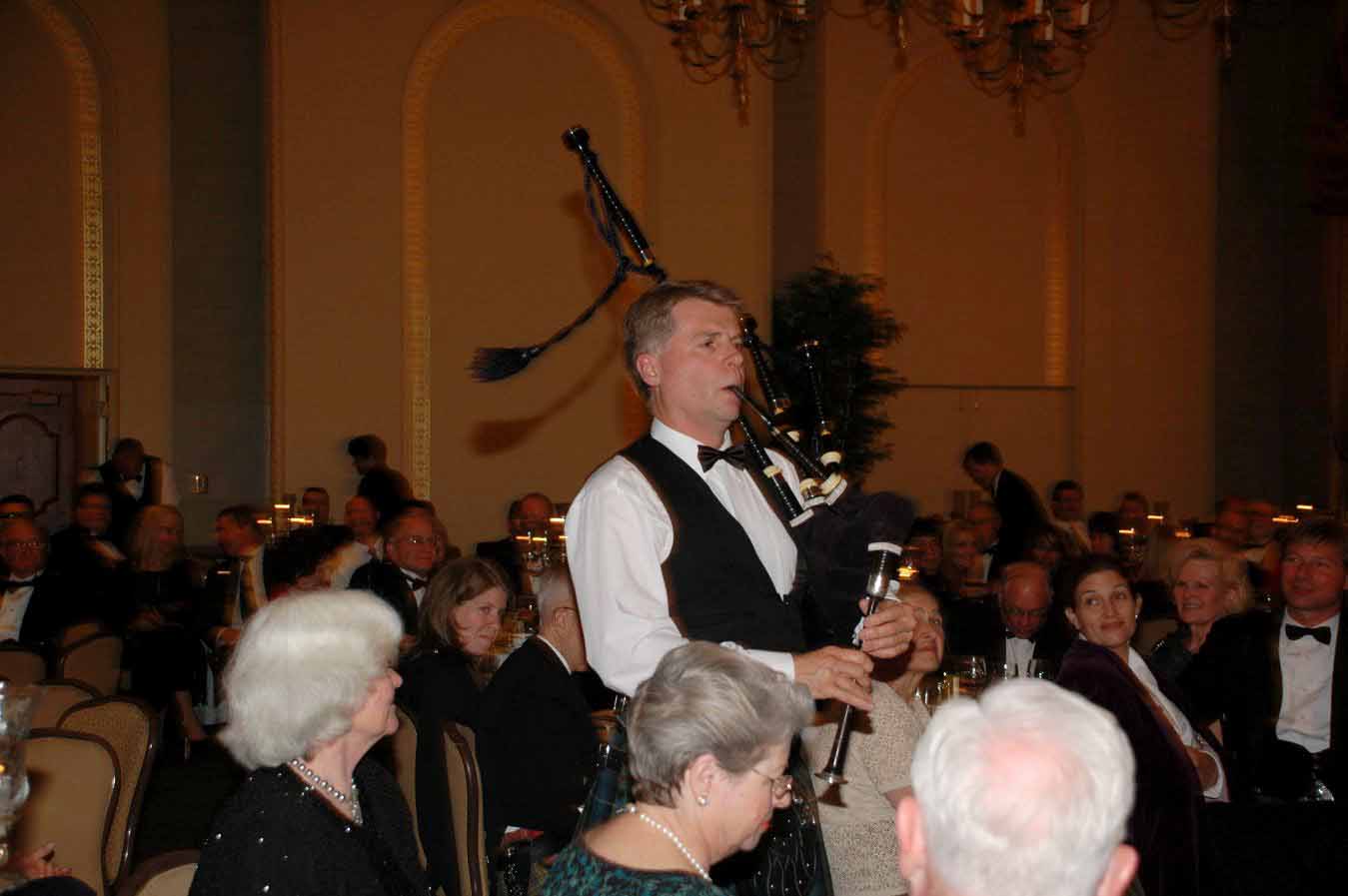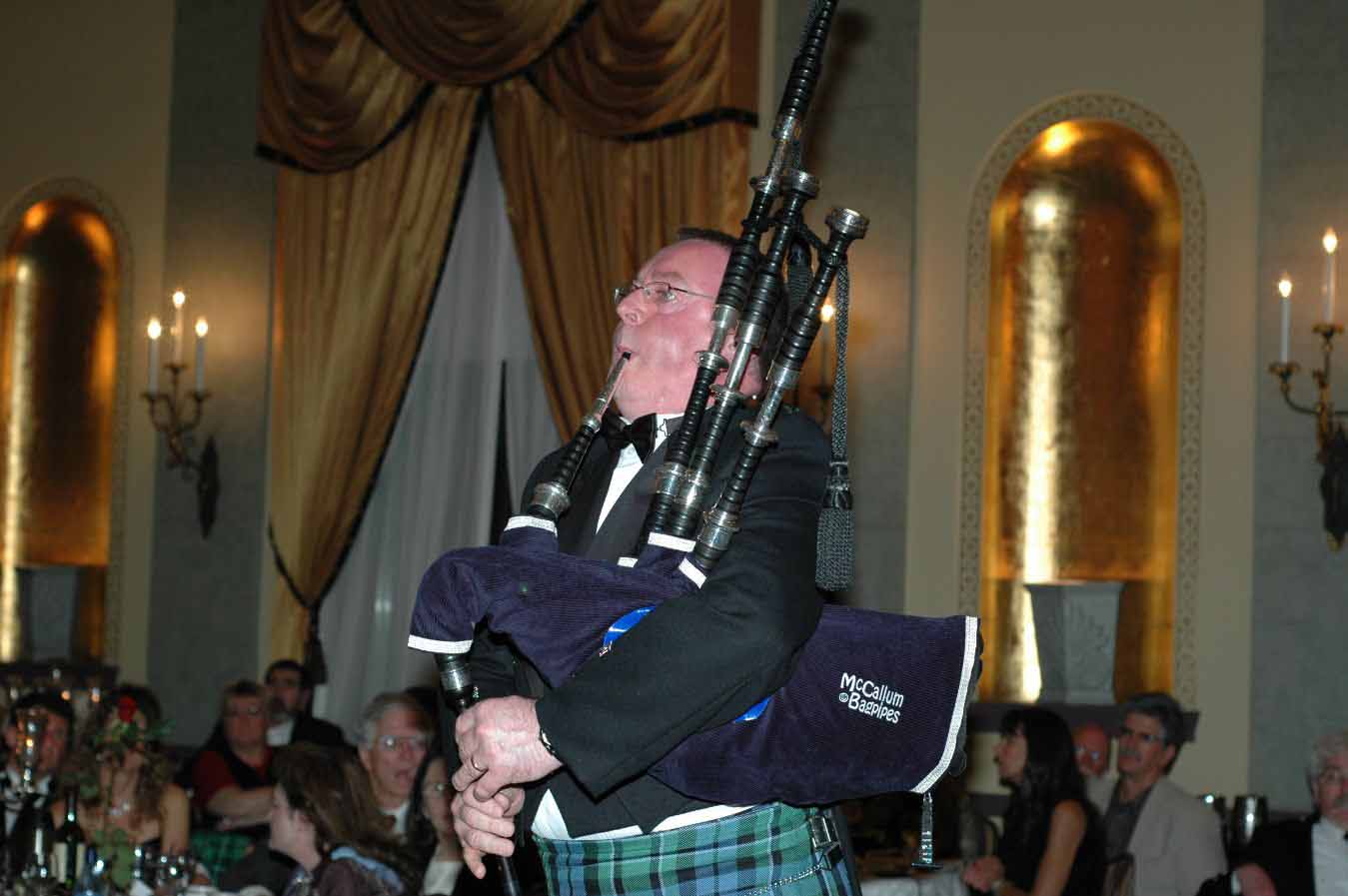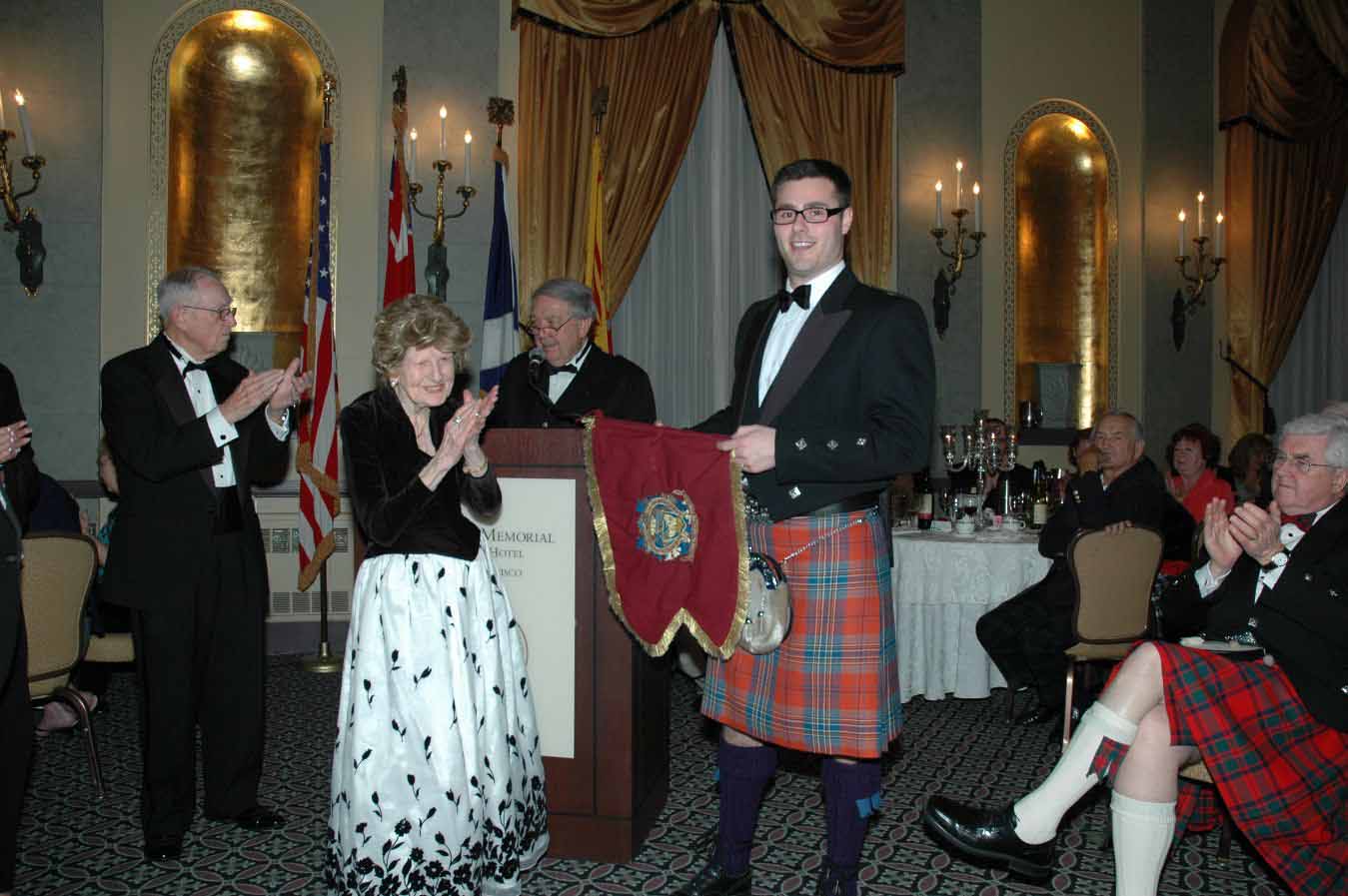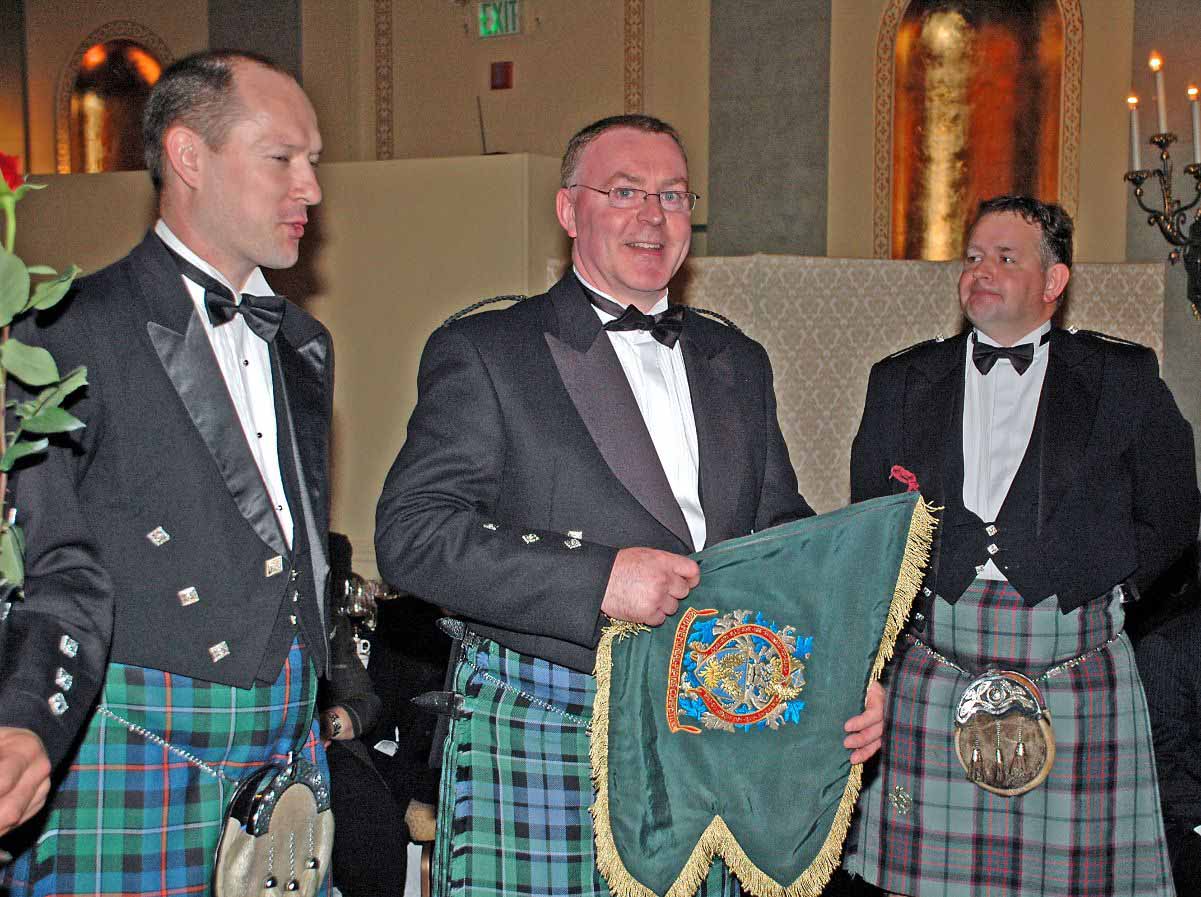Reflections and echoes of the Dr. Dan Reid Memorial Solo Piping Challenge-Recital
Editor’s note: The Dr. Dan Reid Memorial Challenge-Memorial in San Francisco was probably the most elegant and unique events in the solo piping world for a decade. The competition spared no expense and brought in some of the greatest exponents of the art to compete in a black-tie recital dinner reception that attracted San Francisco’s Scots-heritage glitterati paying top dollar to hear the world’s best.
Organized mainly by Ulsterman Ozzie Reid, a significant influence on Northern California piping, the event challenged pipers to learn specific and often obscure pieces of music to compete. The contest put piping on a pedestal and treated performers like rock stars.
Charlie Martin kindly contributed his memories of the Dan Reid, an event that inspired him and many others to take piping to the next level.

Reflections and echoes of the Dr. Dan Reid Memorial Solo Piping Challenge-Recital
By Charlie Martin
Two thousand twenty-one marks an entire decade since the end of San Francisco’s piping competition, the Dr. Dan Reid Memorial Challenge-Recital. This extraordinary competition was held from 1992 to 2011 and brought the top players to perform a challenging program in outstanding venues.
The brainchild of Dr. Dan Reid, and the labour of love of organizers Ozzie Reid and John Dixon, there was nothing to compare on the West Coast of the United States. To keep the Dan Reid Memorial name alive, the St. Andrew’s Society of San Francisco Foundation decided to update the music library that came out of the competition recordings and distribute them to prominent piping institutions to make the recordings more accessible to the general public.
Working on this project, I had the opportunity to refresh my memory on what a wealth of piping knowledge and talent the recordings represent. I’ve also reminisced and reflected on what the Dan Reid Memorial meant to me and my piping life. As part of the project to make the library more visible, I thought I’d share my reflections.
The Dan Reid Memorial brought six of the top winning players of the day to San Francisco each year and later three “up-and-coming” competitors for the Cameron/Gillies Championship. The event paid for the competitors’ travel and offered prizes that were, in the day, considered generous. In exchange, the competition presented a true challenge to whoever accepted it. First, a proscribed tune list was used to encourage the competitors to play music they didn’t often compete with.
Six tunes of each discipline had to be submitted. From that, each competitor was required to play an MSR of two tunes of each discipline, a double hornpipe & jig, a piobaireachd urlar and a full piobaireachd. This evolved to be delivered in a recital format; all the events were played in one standing – no easy task for even a top player, and that was the point.

While attending the Celtic Arts Foundation Winter School, I had the opportunity to talk to many of the Dan Reid Memorial competitors. These conversations made me reflect on the value of the competition beyond its place in the competitive calendar.
The San Francisco Bay area has a long tradition of piping and many opportunities for good instruction. However, at least in the 1990s, there seemed a lack of venues hosting the top players. The Santa Rosa Games hosted competitions in the 1980s where some of the top players competed, and California, in general, has several highly successful players, including Gold Medallist James MacColl. But getting to hear these players in a setting that highlights their talent and the instrument to the fullest was rare. The Dan Reid Memorial was designed to provide that venue and opportunity.
One thing that stands out talking to the top players is their recollection, often as children, of hearing other top players and its effects on their playing. I can’t think of any of the Celtic Arts Foundation Winter School instructors who haven’t told a story of hearing some piping great and that inspiration. That’s missing in California, before the Dan Reid Memorial and again today. Attending the Dan Reid Memorial provided me with my recollections of inspiring performances. It was the first top-notch competition I ever attended.
I remember being amazed at the clarity of the fingerwork. Gracenotes sounded like rifle shots. Doublings truly articulated the music. I heard for the first time the harmonics that can come off a perfectly set up Highland bagpipe. I had heard good players before but never in a setting that made the instrument shine. I heard music played the way it should be played.
I feel they viewed the Dan Reid Memorial as a challenging but quirky early-season competition and missed the whole point of the event.
Ozzie Reid presented music through the prescribed tune list that pipers didn’t often play at the top competitions. “Miss Elspeth Campbell,” two-parted strathspeys and reels, and tunes from the depths of various music collections. I played a lot of music, and even more that I could play and wanted to learn. It was the first time I was introduced to piobaireachd, which led me to explore that art more. In talking to the competitors, all of whom take a perfectly set pipe for granted and are no strangers to venues such as Blair and Dunvegan Castle, or a fine Scottish hotel ballroom, they didn’t appreciate how having access to their playing filled an educational void or influenced me.
I feel they viewed the Dan Reid Memorial as a challenging but quirky early-season competition and missed the whole point of the event. First and foremost, the Dan Reid Memorial was to showcase them to show off their skills to those of us usually deprived of such exposure. In doing so, to inspire the next generation of top players to master the instrument and music.
In 1992, cassette tapes and records were still the norm, with CDs just entering the picture. The internet and instant access to all the pipers of the world were not available. Though notable pipers did come to the Bay Area for piping schools, having regular instruction or exposure to the piping greats wasn’t as common today. As a young adult in 1992, I still pored over music books and wore tapes and records out trying to learn tunes. But, there is no comparison, even with video streaming today, between a recording and a live performance in a great room. A recording can’t duplicate the revelation of hearing the harmonics of a perfectly set pipe change as the performer turned during their march or the clarity of a gracenote that echoes around a room set up to optimize the acoustics.

These were experiences the Dan Reid Memorial provided very well, and all by design. Seeing a top player break down provided an instant realization that these gods of piping sometimes made mistakes as I did. Hearing the difference in tone from one pipe to the next and reading the player’s setup in the program was genuinely educational when the number of different pipe makes was limited to pipers like myself. I could sit back and enjoy hearing the different styles of playing between competitors when the set list for each included “The Cameronian Rant.” I could see and feel the concentration and passion brought to the performances by these outstanding musicians. There was something else I was witnessing but didn’t appreciate until fairly recently. The regulars of the Dan Reid Memorial became a group of top professional pipers, the likes of which hadn’t been seen.
Regulars like Bruce Gandy, Jack Lee, Stuart Liddell, Bill Livingstone, Angus MacColl, Roddy MacLeod, and Willie McCallum became a cadre of incredible players, instructors, and professional pipers. They weren’t just competitors, but comrades who supported and challenged each other to form an all-time great legacy of pipers. These and the many other Dan Reid Memorial competitors broke the norm of shying away from adult learners. They travelled regularly and embraced teaching at all levels and the use of technology.
The Dan Reid Memorial played a role in the evolution of piping in California.
In 1992 it was a rare occasion to hear any of them in the Bay Area, but by 2012 they were regulars at Highland games and teaching bands and solo workshops. I believe the Dan Reid Memorial played a role in this evolution of piping in California.
In 1992 my view and understanding of piping outside of California was limited. Though I was an active piper in a great band and attended games regularly, the opportunity to expose myself to the broader world of piping was limited. By the last Dan Reid Memorial in 2012, I had met many of the competitors, learned that I had a lot to learn, and started to take advantage of the growing opportunities to learn from the best players on the planet. I don’t believe I would have followed that path had it not been for the exposure and education the Dan Reid Memorial provided.

Though opportunities to learn from the best exist like never before, and venues host the greats regularly, there still hasn’t been a venue or event that provided the experience of the Dan Reid Memorial. There is a lot to be said for – and I believe underestimated mainly by the competitors – a venue chosen for acoustics, events designed to challenge, and a competitor lineup chosen to be unequalled. This elevation of piping is something the Dan Reid Memorial did in California, and it is a shame there hasn’t been anything to match it since.
Charlie Martin has been a piper for more than 40 years from the San Francisco area and is currently the pipe-major of the Pipes & Drums of CAL FIRE Local 2881. He started with the San Francisco Boy Scout Band in 1978 and then received instruction from Ozzie Reid, the driving force behind the Dan Reid Memorial. Charlie Martin also played in the Grade 3 Dunvegan Pipe Band from the Bay Area under Reid and, later, Pipe-Major Erik Leiken from 1986 to 2019. He lives in Northern California, a retired forester for CAL FIRE.
Related
Dan Reid cancelled due to lack of players
Hayes and McKeown take down Dan Reid Memorial

I had the pleasure of attending the Dr Dan Reid for about 10 years running. For me, it was the pleasure of listening to the best of the best pipers in the world, while also attending a world class dining experience. For us women, Ozzie Reid would make his way around the maze of dining tables at the end of the evening with long-stemmed red roses for each of us. The pipers would be parceled out to favored tables of supporters; I remember when a younger Stuart Liddell sat at our table, the year he won the Cameron/Gillies. And the ‘after party’ usually in the hotel bar, was full of schmoozing and comradery. But my best memories are of those of the consummate piper and judge, Angus John Mclellan. He was a lovely man and he is sorely missed.